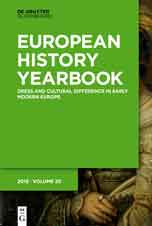News
31.10.2019
New publication: »Dress and Cultural Difference in Early Modern Europe« (European History Yearbook, Vol. 20)
 Dress is a key marker of difference. It is closely attached to the body, part of the daily routine, and an unavoidable means of communication. The clothes people wear tell stories about their allegiances and identities but also about their exclusion and stigmatization. They allow for the display of wealth and can mercilessly display poverty and indigence. Clothes also enable people to play with identities and affinities: for instance, individuals can claim higher social status via their clothes. In many ways, dress is thus open to manipulation by the wearer and misinterpretation by the observer.
Dress is a key marker of difference. It is closely attached to the body, part of the daily routine, and an unavoidable means of communication. The clothes people wear tell stories about their allegiances and identities but also about their exclusion and stigmatization. They allow for the display of wealth and can mercilessly display poverty and indigence. Clothes also enable people to play with identities and affinities: for instance, individuals can claim higher social status via their clothes. In many ways, dress is thus open to manipulation by the wearer and misinterpretation by the observer.
Authorities—whether religious or secular, local or regional—have always aimed at imposing order on this potential muddle. This is particularly true for the early modern era, when the world became ever more complex. In Europe, the composition of societies diversified with the emergence of new social groups and increasing migration and travel. Thanks to intensified long-distance trade and technological developments, new fashionable clothes and accessories entered the market. With the emergence of a consumer culture, it was now the case that not only the extremely wealthy could afford at least the occasional indulgence in luxury items and accessories.
Over recent years, research has focused on a variety of areas related to dress and appearance in the context of early-modern political, socio-economic, and cultural transformations both within Europe and related to its entanglement with other parts of the world. Nevertheless, a significant compartmentalization in the research on dress and appearance remains: research is often organized around particular cities and territories, and much research is still framed by modern national boundaries. This special issue looks at dress and its perception in Europe from a transcultural perspective and highlights the many differences that clothing can express.
Cornelia Aust is a historian of early modern Jewish history at Bielefeld University.
Denise Klein is a historian of the Middle East and a Research Fellow at the IEG.
Thomas Weller is a historian of the Holy Roman Empire and the Spanish-speaking world in the early modern period and a permanent Research Fellow at the IEG.
Dress and Cultural Difference in Early Modern Europe
Edited by Cornelia Aust, Denise Klein, Thomas Weller
European History Yearbook Vol. 20
VI, 212 pages, 8 illustrations (sw) Paperback: UVP *€ [D] 49.95 / *US$ 57.99 / *GBP 45.50 ISBN 978-3-11-063204-0 eBook: PDF ISBN 978-3-11-063594-2 EPUB ISBN 978-3-11-063238-5


